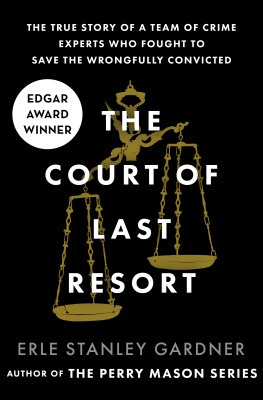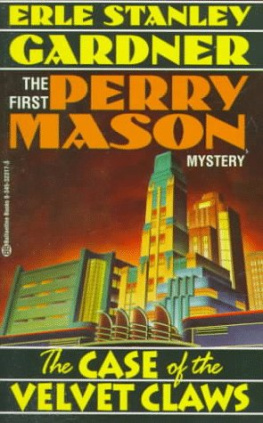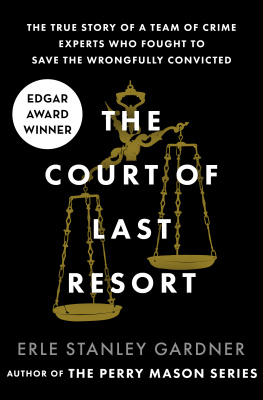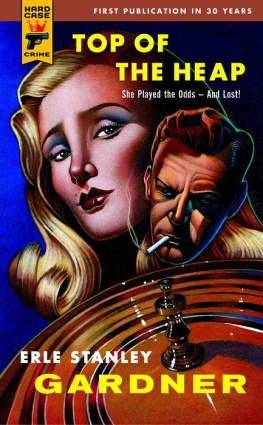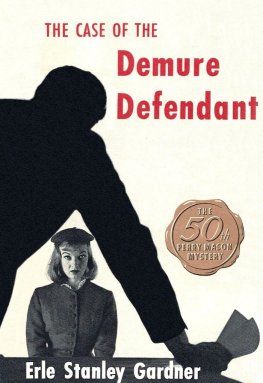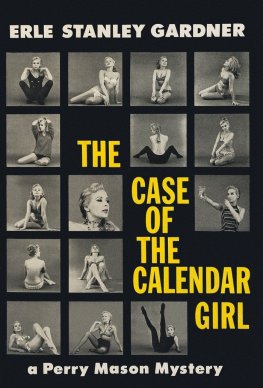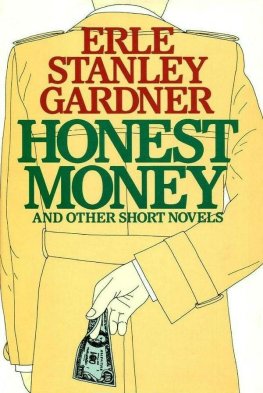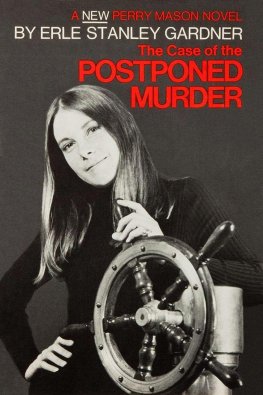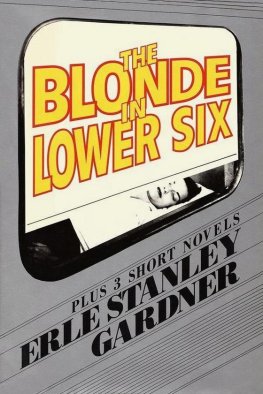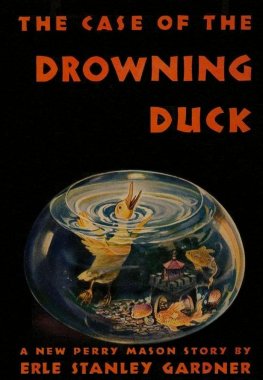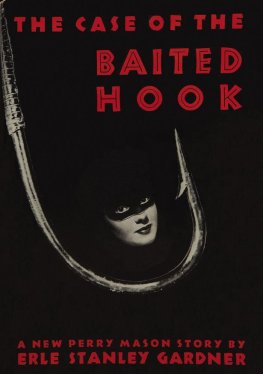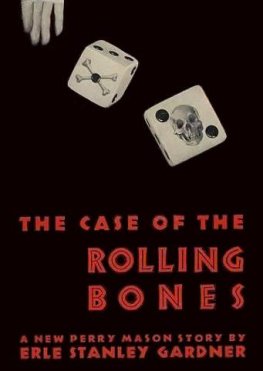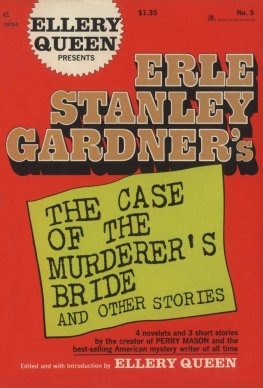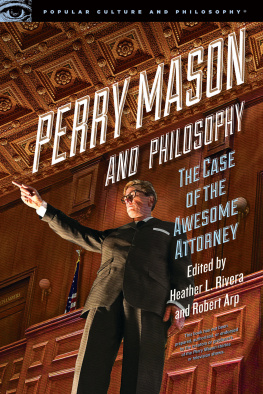The Court of Last Resort
Erle Stanley Gardner

The original edition of this book was published in 1952. Since that time the Court of Last Resort has been functioning even more vigorously and with a greatly increased sphere of activities. For this new edition, Mr. Gardner has considerably re-edited the original book and has added a great deal of new material.
DEDICATION
As will be seen by those who read this book, turning the idea of the Court of Last Resort into an actuality called for a co-ordinated effort of considerable magnitude.
I want to take this opportunity to express my appreciation to my associates for their loyalty, and to make public acknowledgment to Harry Steeger, owner of Argosy Magazine.
It is all too easy for a magazine publisher to agree to a course of conduct in the white heat of enthusiasm, but to continue on an even course, month after month, year after year, when that course involves a considerable financial sacrifice, is an entirely different matter.
When we first started this work Steeger said to me, Erle, you are going to be out on the firing line. There will be times when youll have to make up your mind as to what should be done without having any opportunity to get in touch with my office. I want you to know that when such situations arise, you are to use your best judgment, and Ill back you to the limit. You have the power to determine the policy of the magazine in all matters relating to the Court of Last Resort.
Fortunately such occasions have been few in number, but there have been two or three times when it became necessary to reach and announce almost instantaneous decisions. These were in moments of stress when any hesitation would have been a sign of weakness. We had to announce that if certain things were done the magazine would fight to the finish. At such times it was a great satisfaction to know that Steeger had meant exactly what he said, and that hed go on fighting with us to the last ditch and the last dollar.
During the six and a half years the Court of Last Resort has been functioning, Harry Steeger has never wavered, has never tried to pull back. He has done exactly what he told us he would do at the start of the organization.
I have known Steeger for some twenty-five years, during which time there has been a close, friendly association which I value as one of my most cherished relationships. We have been on numerous adventures together. I have learned to know, to respect and to admire his bulldog tenacity and his fighting stamina.
And now, on behalf of my associates and myself, I want to make public thanks to him for the steadfastness of purpose which made The Court of Last Resort possible.
So I dedicate this book to my friend:
H ARRY S TEEGER
Erle Stanley Gardner
Man in general doesnt appreciate what he has until he is deprived of it. Then he starts to miss it. He takes good health for granted until sickness comes along. He takes three meals a day for granted until some unusual circumstance makes him go hungry. Liberty is only a term until he is deprived of it, and then he begins to realize what it means to have freedom of motion and freedom of choice.
Strange as it may seem, a diametrically opposite situation led to the origin of the Court of Last Resort.
I learned to value liberty not by having it taken away but by having such a marvelous demonstration of the advantages of freedom that I began to think what it must mean to be deprived of freedom.
In order to understand this somewhat paradoxical situation it is going to be necessary to touch on a most unusual murder case and give a bit of personal history.
The murder case is that of William Marvin Lindley, described in newspapers and magazines as The Red-Headed Killer; the personal history relates to a biographical sketch written by the late Alva Johnston which ran several installments in The Saturday Evening Post. This biographical sketch was entitled The Case of Erle Stanley Gardner, and included some of the spectacular and unorthodox methods which I used in connection with the trial of cases when I was a practicing attorney.
I have always claimed that an attorney is not necessarily bound to confine his cross-examination of a hostile witness to questions and answers on the witness stand. If a witness is certain of an identification, he should be absolutely certain of it. He may testify under oath with all the positive sincerity in the world that the defendant is the man he saw running away from the scene of the crime two years ago, but if an attorney can get him to point to one of the assistant prosecutors by making the witness feel that the man at whom he is pointing is actually the defendant in the case, the witnesss actions speak louder than words.
Of course, courts resent attempts to mislead a witness, so an attorney may well find himself in a position where the procedure, by which he might demonstrate that a witness is mistaken on a matter of identification, may be frowned upon by the court.
Therefore the problem of getting a witness to belie his words by actions, without violating the ethics of the profession or the rules of court is, at times, a rather tricky business.
During the days when I first engaged in the practice of law, legal ethics were not as sharply defined nor as rigidly enforced as they now are, and, with the singular optimism of youth, I was more confident of my own interpretation of what was proper.
I mention these matters because the early portion of my legal career, during which I was trying to build up a law practice in a city where I was virtually without friends or friendly contacts, was punctuated with spectacular incidents which made colorful copy for a biographer. As I expressed it at the time in a letter to my father, I have built up a law practice in which I am dealing with large numbers of clients of all classesexcept the upper and middle class.
Eventually my courtroom tactics attracted sufficient attention so that my practice became confined exclusively to clients of the upper and middle class, but Alva Johnston found the earlier chapters of my legal escapades much more interesting and therefore emphasized them in considerable detail.
Johnston also emphasized a quixotic streak which has always been part of my nature: to champion the cause of the underdog, particularly if he is without friends, without money, and his cause seems to be utterly hopeless.
By the time Johnston had finished stringing colorful incidents into his biographical sketch, his audience might well have received the impression that I made a habit of entering the lists on behalf of penniless defendants who were in hopeless predicaments, and by legal legerdemain could cause the doors of prison to swing wide open. The result was that just about every hopeless case in the United States was dumped in my lap in a deluge of fan mail.
Among these cases was that of William Marvin Lindley. This case was sent to me by Al Matthews, Jr., a Los Angeles attorney at law who has since become affiliated with the Public Defenders Office, but who, at that time, was a free lance. He had interested himself on behalf of Lindley after Lindleys conviction.
Lindley was at the time in the condemned row at San Quentin awaiting execution. He had been convicted of a brutal sex murder. The evidence against him was so overwhelming that until Al Matthews came along no one had extended the slightest sympathy or had bothered to give the case very much detailed study.

